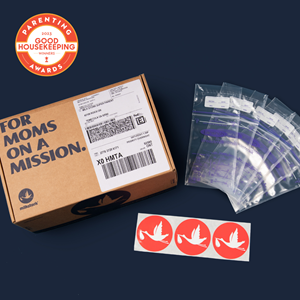Pumping, Working, Traveling: Challenges for New Moms In the Workplace
By Milk Stork Team on November 16, 2023

New moms returning to work encounter distinctive challenges that often go unnoticed. The delicate balance of managing career responsibilities, particularly involving travel, while navigating the demands of infant care can be an incredible task. This is compounded when that mother is breastfeeding. The ability to pump and deliver that nourishment to their baby while on the road is an intense undertaking that requires significant support.
For employers, understanding and addressing these challenges isn't just a matter of empathy or compliance; it's a strategic imperative. Why? Supporting new parents in the workplace isn't just about individual employees—it's about fostering a workplace culture that values inclusivity, promotes employee well-being, and ultimately drives organizational success.
Navigating the Trifecta: Pumping, Working, and Traveling
The Challenges New Parents Face
Pumping while on the move demands meticulous planning to ensure both mom's and baby's needs are met efficiently and hygienically.
When considering travel for breastfeeding mothers, several key items are crucial:
- Storage Supplies:
Breast milk is extremely temperature-sensitive and requires proper storage. In addition to leak-proof breast milk storage bags, pumping parents also need an insulated cooler to ensure that expressed breast milk remains at a consistent temperature during travel until it can be refrigerated or frozen. To complicate matters even more, the CDC recommends that breast milk be refrigerated at 40°F or frozen at 0°F or colder. Standard hotel refrigerators and freezers do not reach those temperatures, so pumping parents must make arrangements with their hotel in advance. - Shipping Supplies:
The right shipping supplies are essential for parents who opt to ship their breast milk, which includes a sturdy cooler that can withstand the rigors of transit and maintain CDC-approved temperatures. Vacuum-insulated coolers keep breast milk refrigerated or frozen during shipment, protecting breast milk from spoilage. - Additional Prep Time:
Breastfeeding parents often face inquiries about the purpose of carrying breast milk or an empty cooler, especially when traveling without their baby, which can further extend the time required for security procedures. Preparing breast milk for travel is a process that requires additional time and attention. Travelers must pack breast pumps, expressed milk, storage supplies, and bottles separately. They are subject to additional security screening when going through TSA, inevitably leading to more time spent at the airport.
How Employers Can Help
In 2019, Human Resource Executive reported that:
“Stress about pumping at work is the second biggest reason women don’t return to their job after maternity leave.”
In response, more companies are supporting breastfeeding parents returning to work. According to Forbes:
“Companies that create a supportive culture for continued breastfeeding help both new mothers, and the company as a whole...employees from companies that have lactation support programs reported a 94.2% retention rate.
Support programs are even more invaluable for traveling employees dealing with lactation. So, what assistance can employers offer in their benefits packages that help these new parents?
Breast Milk Shipping
 Breast milk shipping is an overlooked provision that helps traveling new parents address their unique obstacles.
Breast milk shipping is an overlooked provision that helps traveling new parents address their unique obstacles.
Employers can enhance their benefits package with this service to:
- Alleviate the stress new parents face when returning to work and traveling.
- Simplify the process of delivering breast milk to their babies by providing pre-labeled drop-off shipping boxes.
- Boost the productivity of traveling parents by facilitating breast milk shipping so they're not preoccupied with pumping enough nourishment for their babies before and during trips.
Companies looking to help ease the issues facing mothers returning to work should consider adding this niche benefit—and more certainly are. Companies like Salesforce, Home Depot, Hilton, SAP, Bausch Health Companies, Nissan, and Pinterest are adding milk shipping as an employee benefit to enable new parent employees to travel confidently, knowing their babies will continue to receive all of the proven benefits of breast milk.
Employers Rising Above the Competition
Addressing the distinctive challenges faced by new parent employees who travel for work is just the tip of the iceberg in creating an attractive, family-friendly workplace. Our new ebook, Cultivating a Family-Friendly Workplace: A Journey from Fertility to Childhood and Beyond, offers insights into comprehensive benefits that go beyond the basics. It covers everything from pre-family planning to childcare support, providing strategies to enhance your company's appeal to top talent.
Download to explore how you can create an inclusive, supportive work environment for all employees.



